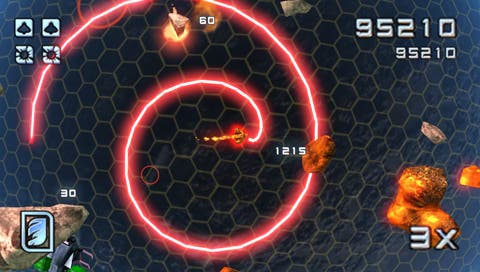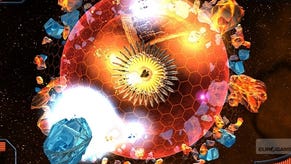Super Stardust Portable
Trigonometry Wars.
Despite the obvious similarities, Super Stardust is a more complex game than Geometry Wars, at least in terms of the interactive options it presents to players. The three different weapon types can be switched between using the d-pad, each one especially effective against different enemy and asteroid types (as indicated by your target's own colour scheme). In addition to a smart bomb, triggered by the right trigger, a quick dash is controlled by the left trigger, a useful evasive manoeuvre that renders your ship momentarily invulnerable. This dash must then recharge before you can use it again, ensuring that the timing of deployment must be carefully considered.
Much of the appeal of the twitch shooter is found in competitive play. Super Stardust Portable offers international high-score tables which can be accessed via connection over the PSP network, a process that worked relatively smoothly for us. In this regard handheld play is always going to suffer by comparison to the persistently online consoles where updates are instant. For some, uploading and comparing scores will be too much of a time-consuming chore. Again though, this is as a result of the hardware limitations itself, rather than any shortcoming on the part of the developer. Likewise, on a technical level the game runs beautifully on the handheld, its slick frame-rate holding under considerable on-screen strain. The game's bright, neon colour scheme is well-suited to the system's generous widescreen and the short, sharp gameplay is perfect for gaming on the move.

Almost all of the game's issues, then, are down to the physical hardware used to control it. For example, switching between weapon types requires you to move your finger off the analogue nub and onto the d-pad, a physical stretch that can be costly in the heat of battle. Keeping both of your index fingers on the trigger buttons at all times grows painful after a while. Your view on the action has also been compromised with the move to the handheld. Whereas in the original you had a good view of the play area, stretching off round the curve of the planet, now the view is slightly zoomed in, making paths around the globe stages harder to plan.
The handheld version also suffers from a lack of play modes. While Impact mode, in which your cannons are muted and you can only boost through enemies, is a welcome addition, the omission of the PS3's Survival, Endless and Bomber (to be released as add-on downloads at a later date) counts against the package. As such, the game is best recommended to newcomers, those for whom the (slight) downgrade from analogue to digital shooting will be unnoticeable. Super Stardust Portable is still an exemplary Western shooter, but for fans of the PlayStation 3 original, there is little here to inspire repeat purchase, the convenience of portability offset by the hardware's other limitations.











